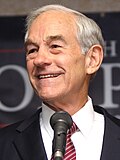| Poll source | Date | 1st | 2nd | 3rd | Other |
|---|
|
| Caucus results [7] Turnout: 66,091 | Feb. 7, 2012 | Rick Santorum 40.3%  | Mitt Romney 34.9% | Newt Gingrich 12.8% | Ron Paul 11.8%, Rick Perry 0.1%, Jon Huntsman 0.1%, Michele Bachmann 0.0%, Others 0.1% |
| Public Policy Polling [8] Margin of error: ±3.2% Sample size: 938 | Feb. 4–6, 2012 | Mitt Romney
37% | Rick Santorum 27% | Newt Gingrich 21% | Ron Paul 13%, Someone else/Not sure 2% |
| Public Policy Polling [9] Margin of error: ±4.3% Sample size: 527 | Feb. 4, 2012 | Mitt Romney
40% | Rick Santorum 26% | Newt Gingrich 18% | Ron Paul 12%, Someone else/Not sure 3% |
| Public Policy Polling [10] Margin of error: ±4.4% Sample size: 500 | Dec. 1–4, 2011 | Newt Gingrich
37% | Mitt Romney 18% | Michele Bachmann 9% | Ron Paul 6%, Rick Perry 4%, Rick Santorum 4%, Jon Huntsman 3%, Gary Johnson 1%, Undecided 16% |
| Project New West/Keating Research [11] Margin of error: ±7.2% Sample size: – | Sep. 19–22, 2011 | Mitt Romney
24% | Rick Perry
20% | Michele Bachmann 7% | Newt Gingrich 7%, Herman Cain 5%, undecided 19% |
| Public Policy Polling [12] Margin of error: ±5.5% Sample size: 314 | Aug. 4–7, 2011 | Rick Perry
20% | Mitt Romney
20% | Michele Bachmann 12% | Sarah Palin 11%, Ron Paul 8%, Herman Cain 7%, Newt Gingrich 6%, Tim Pawlenty 3%, Jon Huntsman 2%, someone else/undecided 11% |
Mitt Romney
22% | Rick Perry
21% | Michele Bachmann 15% | Newt Gingrich 9%, Ron Paul 7%, Tim Pawlenty 6%, Herman Cain 5%, Jon Huntsman 2%, someone else/undecided 13% |
| Public Policy Polling [13] Margin of error: ±4.9% Sample size: 400 | Feb. 4–6, 2011 | Mitt Romney
19% | Mike Huckabee
16% | Sarah Palin
16% | Newt Gingrich 12%, Ron Paul 9%, Tim Pawlenty 7%, John Thune 4%, Mitch Daniels 3%, someone else/undecided 16% |
| Public Policy Polling [14] Margin of error: ±5.3% Sample size: 341 | Oct. 30–31, 2010 | Mitt Romney
22% | Newt Gingrich
17% | Sarah Palin
17% | Mike Huckabee 14%, Tim Pawlenty 6%, Mike Pence 3%, John Thune 2%, Mitch Daniels 1%, someone else/undecided 18% |
| Public Policy Polling [15] Margin of error: ±4.6% Sample size: 448 | May 14–16, 2010 | Sarah Palin
29% | Mitt Romney
25% | Mike Huckabee 18% | Newt Gingrich 16%, Ron Paul 9%, undecided 3% |
| Public Policy Polling [16] Margin of error: ±4.4% Sample size: 497 | Mar. 5–8, 2010 | Mitt Romney
44% | Sarah Palin 25% | Mike Huckabee 17% | Undecided 14% |




